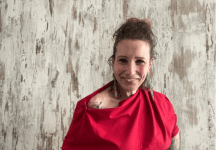Creating Waves in Rural India
By Randi Morse
Shirin Shabana Khan is an academic and professional social worker with extensive education and experience in social work. While working as a translator in malnourishment cases in eastern Uttar Pradesh, Shirin was considerably impacted by the death of a severely malnourished girl. Due to that experience, she decided to stay and continue her social work in its communities. She is now the programme director of the organisation Peoples’ Vigilance Committee on Human Rights (PVCHR) and leads the ‘Healing and Empowering Marginalized Communities in India’ initiative, which focuses on creating torture free model villages in rural India.
You’ve said you were involved in a lot of social activities as a child. Can you tell us a bit more about this?
I was involved in many social activities in my school as well as in my home. I got my primary education at the Kachhawa Christian School near my house. In the school, we had one period we were divided into groups and we had different activities such as growing vegetables, repairing our old books and copies, and collecting newspapers. We have to identify one poor family living nearby our school and help them. Books and copies were given to students who were in need.
Even our family provided food and other essential things to the migrant and stranded. We gave clothes, books, and even provided tuition to the poor children. I saw my mother give stitching training to the young girls and women living nearby. 
Was there a particular moment that had a significant impact on you which set you on the career path of a social worker?
I completed my studies, both bachelor’s and master’s degrees, in social work. I joined the People’s Vigilance Committee on Human Rights in 2007. At that time, I was working as a translator for doing translation of cases of hunger and malnourishment among the weavers and excluded communities in eastern Uttar Pradesh. The death of a severely malnourished girl had made a significant impact on me and I stayed back and chose to do my career here.
Has COVID-19 had an impact on the communities you’re working in and the work you’re doing?
COVID-19 has impacted the communities with whom we are working. We are working with people belonging to vulnerable communities such as Musahar, Nut, Noniya, Ghaisa, Chamar etc. These communities are mostly working as landless workers, begging, and selling leaf plates. Only a few families converted as farmers and are doing agriculture on teesariya – one third of the grown crops. Due to the restriction of movement they are unable to go and work outside. They went from poor to poorest and living on the verge of survival. 
With PVCHR intervention, they received rations and are now working under Mahatma Gandhi Rural Employment Guarantee Act (MNREGA) in their native place.
Yes, it also affects our work too. We all started to work from home. Only our founders, Shruti Nagvanshi and Lenin Raghuvanshi, were moving with the pass for providing rations and other essential needs. Now we are unable to directly reach out to survivors, but we are trying our best to provide support. We are providing counselling through telephone, maintaining physical distancing, and hand washing.
In your work you’re dealing with a lot of trauma. How do you stay positive?
Yes, in our work we have to deal with lots of trauma. PVCHR has various initiatives for taking care of caretakers:
1. Sharing the stories in a small group of therapists
2. Celebration of birthdays and annual days
3. Appreciating the work of colleagues
4. Standing together with staff who are in need
Personally, I stay positive after spending time in nature doing gardening or feeding birds and fish.
Can you tell us about a time you’ve witnessed a positive change or impact from the work you do?
There are many times when we witnessed a positive change in our work, and it impacted the lives of the children, youth, women, and men of the marginalised communities.
Elimination of the culture of silence, fear, and phobia of organised violence and torture are the predominant factors of resilience to inculcate social transformation. It contributes to poverty elimination. The stories of Sarai and Sakara villages are the classical examples of how change happens.

This development was possible due to the continuous engagement of the community and Peoples’ Vigilance Committee on Human Rights (PVCHR), with timely implementation of the strategy. They sat together and decided to bring the complaint before the open hearing on atrocities against Scheduled Castes (SC), organised by the National Human Rights Commission (NHRC), in Varanasi, on November 25-26, 2013. They lodged a complaint with the commission, according to the minutes of the folk school, community meetings, and individual testimonies.
Perhaps for the first time, the Musahars -of Sarai village-, with full confidence and without any fear, narrated their suffering to the two presiding officers of the open hearing. They had regained their lost voice and their collective identity.
The success of Sarai village achieved by the people of Sarai is creating waves in the struggle against poverty, injustice, caste system and torture, and organised violence.
Are there things our readers can do to contribute to the cause of human rights?
It is to request the reader to please involve yourself with the issue of human rights; doing volunteering, financially supporting the cause, or standing with the survivors who are in need. If you want, you can be part of our mission for creating a better place. Please follow our work and contribute to us. www.pvchr.asia














